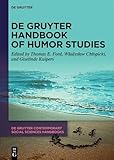De Gruyter Handbook of Humor Studies / ed. by Thomas E. Ford, Władysław Chłopicki, Giselinde Kuipers.
Material type: TextSeries: De Gruyter Contemporary Social Sciences Handbooks ; 2Publisher: Berlin ; Boston : De Gruyter, [2024]Copyright date: 2024Description: 1 online resource (VIII, 636 p.)Content type:
TextSeries: De Gruyter Contemporary Social Sciences Handbooks ; 2Publisher: Berlin ; Boston : De Gruyter, [2024]Copyright date: 2024Description: 1 online resource (VIII, 636 p.)Content type: - 9783110755732
- 9783110755800
- 9783110755770
- online - DeGruyter
- Issued also in print.
| Item type | Current library | Call number | URL | Status | Notes | Barcode | |
|---|---|---|---|---|---|---|---|
 eBook
eBook
|
Biblioteca "Angelicum" Pont. Univ. S.Tommaso d'Aquino Nuvola online | online - DeGruyter (Browse shelf(Opens below)) | Online access | Not for loan (Accesso limitato) | Accesso per gli utenti autorizzati / Access for authorized users | (dgr)9783110755770 |
Frontmatter -- Contents -- Preface -- Part 1: Essence of Humor: What Makes Something Funny? -- Section 1: Psychological Processes: Why Do People Find Things Humorous? -- 1 Psychological Approaches to Humor: The Interaction of Cognition and Motivation -- 2 Personality Approaches: Beyond the ‘Sense of Humor’ -- 3 Evolutionary Approaches to Humor: Critical Review and New Advances -- 4 The Neuroscience of Humor -- Section 2: Text Properties: What Makes a Text Humorous? -- 5 Computational Humor Models and Applications -- 6 The Role of Incongruity in Humorous Texts -- 7 Cognitive Approaches to Humor: Linguistic, Developmental, and Affective Science Considerations -- 8 Humor and Figurative Language -- Section 3: Broader Social Context: How is Humor Shaped by Social Relations and Culture? -- 9 Failed Humor -- 10 Humor and Culture -- 11 Humor and Translation: Cultural Implications -- 12 Cultural Analysis of Racial and Ethnic Humor -- Part 2: The Functions of Humor: How Do People Experience, Perform and Share Humor? -- Section 1: Psychological Processes: What Functions Does Humor Serve for the Individual? -- 13 Effect of Humor on Cognition -- 14 Humor Appreciation Across the Lifespan -- 15 Humor, Health, and Well-Being: Is Humor Really Good for Us? -- Section 2: Text Properties: What Contextual Factors Affect Humor Perception? -- 16 The Sociopragmatics of Humor -- 17 Conversational Humour -- 18 Satire and Parody -- 19 New Forms and Genres of Humor in Social Media -- Section 3: Broader Social Context: How Does Humor Function in Social Relations and Culture? -- 20 Humor as a Double-Edged Sword: Uniting and Dividing in Social Interaction -- 21 The Role of Humor in Initiating Romantic Relationships -- 22 Gender and Humor: The New State of the Art -- 23 Ethnic Humor Across Cultures: Prevalence and Appeal -- 24 Disparagement Humor and Subversion -- 25 Humor in Media and Popular Culture -- 26 Political Humor -- 27 Culture and Comedy: Stand-up across Cultures -- 28 The Art and Efficacy of Clowning -- 29 The Dark Side of Stand-Up Comedy -- 30 Play or Power: The Social Significance of the Practical Joke -- 31 The Ethics of Humor and Comedy -- 32 Humor in Religious Contexts: An Overview -- 33 Humorless or Humor-Friendly Religion? Psychological Theory and Research -- Postscript: Humor: Universality, Genealogy, and Concept Formation -- Contributors -- Index
restricted access online access with authorization star
http://purl.org/coar/access_right/c_16ec
The De Gruyter Handbook of Humor Studies consolidates the cumulative contributions in theory and research on humor from 57 international scholars representing 21 different countries in the widest possible diversity of disciplines. It organizes research in a unique conceptual framework addressing two broad themes: the Essence of Humor and the Functions of Humor. Furthermore, scholars of humor have recognized that humor is not only a universal human experience, it is also inherently social, shared among people and woven into the fabric of nearly every type of interpersonal relationship. Scholars across all academic disciplines have addressed questions about the essence and functions of humor at different levels of analysis relating to how narrowly or broadly they conceptualize the social context of humor. Accordingly, the editors have organized each broad thematic section into three subsections defined by level of analysis. The book first addresses questions about individual psychological processes, then discusses text properties, and finally moves to questions involving broader conceptualizations of the social context addressing humor and social relations, as well as humor and culture. By providing a comprehensive review of foundational work as well as new research and theoretical advancements across academic disciplines, the De Gruyter Handbook of Humor Studies will serve as the foremost authoritative research handbook for experienced humor scholars as well as an essential starting point for newcomers to the field, such as graduate students seeking to conduct their own research on humor. Further, by highlighting the interdisciplinary interest of new and emerging areas of research the book identifies and defines directions for future research for scholars from every discipline that contributes to our understanding of humor.
Issued also in print.
Mode of access: Internet via World Wide Web.
In English.
Description based on online resource; title from PDF title page (publisher's Web site, viewed 20. Nov 2024)


